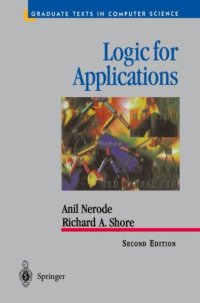
Ebook: Logic for Applications
Author: Anil Nerode Richard A. Shore
- Genre: Mathematics // Logic
- Tags: Logics and Meanings of Programs, Mathematical Logic and Foundations, Mathematical Logic and Formal Languages, Artificial Intelligence (incl. Robotics)
- Series: Graduate Texts in Computer Science
- Year: 1997
- Publisher: Springer
- Edition: 2nd
- Language: English
- djvu
In writing this book, our goal was to produce a text suitable for a first course in mathematical logic more attuned than the traditional textbooks to the re cent dramatic growth in the applications oflogic to computer science. Thus, our choice oftopics has been heavily influenced by such applications. Of course, we cover the basic traditional topics: syntax, semantics, soundnes5, completeness and compactness as well as a few more advanced results such as the theorems of Skolem-Lowenheim and Herbrand. Much ofour book, however, deals with other less traditional topics. Resolution theorem proving plays a major role in our treatment of logic especially in its application to Logic Programming and PRO LOG. We deal extensively with the mathematical foundations ofall three ofthese subjects. In addition, we include two chapters on nonclassical logics - modal and intuitionistic - that are becoming increasingly important in computer sci ence. We develop the basic material on the syntax and semantics (via Kripke frames) for each of these logics. In both cases, our approach to formal proofs, soundness and completeness uses modifications of the same tableau method in troduced for classical logic. We indicate how it can easily be adapted to various other special types of modal logics. A number of more advanced topics (includ ing nonmonotonic logic) are also briefly introduced both in the nonclassical logic chapters and in the material on Logic Programming and PROLOG.
This textbook provides a first introduction to mathematical logic which is closely attuned to the applications of logic in computer science. In it the authors emphasize the notion that deduction is a form of computation. Whilst all the traditional subjects of logic are covered thoroughly: syntax, semantics, completeness, and compactness; much of the book deals with less traditional topics such as resolution theorem proving, logic programming and non-classical logics - modal and intuitionistic - which are becoming increasingly important in computer science. No previous exposure to logic is assumed and so this will be suitable for upper level undergraduates or beginning graduate students in computer science or mathematics.
From reviews of the first edition: "... must surely rank as one of the most fruitful textbooks introduced into computer science ... We strongly suggest it as a textbook ..."
SIGACT News